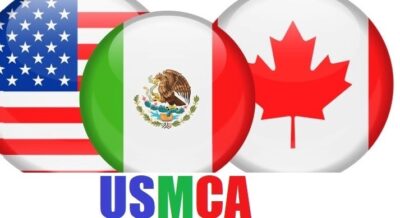By: Bruce Leeds, Of Counsel, Braumiller Law Group
The United States-Mexico-Canada Agreement (USMCA) will replace NAFTA and likely go into effect by Jan. 1, 2021.
Your company exports to Canada and Mexico. So:
- So long as you can produce a Certificate of Origin everything is taken care of
- NAFTA and USMCA are import things, so if you are an exporter you have no concerns
- The importers in Canada and Mexico are the only ones who have to deal with the requirements
Wrong, wrong and wrong!
The USMCA is making a number of changes and revisions to the current NAFTA rules. One of these involves the Certificate of Origin. The Certificate of Origin is currently used to prove NAFTA eligibility to the Customs authorities in the country of import. The USMCA will eliminate the Certificate of Origin. It will be replaced by a certification signed by the producer, exporter or importer. According to the text of the agreement, the certification may be completed by the importer “on the basis of the importer having information, including documents that demonstrate that the good is originating.” The producer or exporter may complete a certification on the same basis.
We should note that the producer is the party that manufactures the article; the exporter is the party that sells the article for export; and the importer is the party that appears as importer of record in its country.
As an example, let’s suppose that Acme Corporation (Acme) in the US is exporting to Trudeau Industries (Trudeau) in Canada. Trudeau wants to claim duty free treatment under the USMCA. Would Trudeau have “information, including documents that demonstrate that (where?) the good is originating”? Not likely. Trudeau could simply sign off on an import certification with no backup documentation and claim USMCA benefits. Definitely not a good idea because there are some serious consequences for false or unsupported claims as described later in this article. What is Trudeau to do? It could turn to Acme for supporting documentation including bills of material, process descriptions, manufacturers affidavits and other documentation to show that the articles exported to Trudeau meet USMCA rules of origin.
Let’s further suppose that Mary Jane Smith is the export compliance person at Acme. She normally does screening, and EAR and ITAR compliance. Along comes an urgent request from Trudeau for documentation to support the Canadian import claim. Where will the request from Trudeau wind up? On Mary’s desk? Yikes! Mary will need to do some quick learning on USMCA rules of origin.
What if Acme. as an expedient. simply has an employee sign off on a certification and sends it to Trudeau? Trudeau could then clear the shipment duty free under USMCA and everyone would be happy. Maybe not. Let’s look at the verification and enforcement provisions of USMCA:
- The certification must be in the possession of the importer at the time a claim is made. The Customs authorities in the country of origin can request a copy of the certification at the time of entry or after the fact.
- The Customs authorities in the country of export may request a copy of the certification from the producer or exporter.
- The producer or exporter must retain a copy of any certification it makes and all records necessary to support the certification for five years. These include the order or contract for sale of the exported article, records of the purchase of all direct and indirect materials used in producing the article and records of production of the article in the form in which it was exported.
- From Section 5.6 of the USMCA “A Party may apply measures as the circumstances may warrant when an exporter or a producer in its territory fails to comply” with the USMCA requirements.
- The Customs authorities in the country of import may conduct a verification of the USMCA claim by means of a questionnaire sent to the producer, exporter or importer of the article. They may also perform a verification visit (read “audit”) of the producer or exporter to request information or documents or observe the production of the exported article.
- If a verification questionnaire or visit indicates a pattern of conduct by a producer, exporter or importer of making false or unsupported claims, the Customs authorities in the country of import may withhold preferential treatment of identical goods until the party making the claims demonstrates compliance with USMCA requirements.
- If a producer, exporter or importer fails to cooperate with a verification questionnaire or visit, the Customs authorities in the country of import may deny USMCA preferential duty claims.
- If the Customs authorities in the country of import determine that the importer made false or unsupported claims for preferential USMCA treatment, the claims will be denied, and the importer will be assessed duty after the fact.
- Of course, the Customs authorities in the country of import may assess penalties for making false or unsupported claims under the laws and regulations of that country.
- If the importer suffers additional duties and penalties as a result of the producer or exporter making a false or unsupported certification for USMCA benefits, the importer could take action against the producer or exporter, such as cancellation of contracts or instigation of civil lawsuits to recover damages. (This is outside of the USMCA law or regulations.)
Given all this should Acme providing any sort of USMCA certification without fully determining whether its exports meet the USMCA requirements and ensuring there are sufficient records to support it? Should Trudeau be accepting any sort of USMCA certification from Acme without conducting some due diligence into the veracity of the document?
The USMCA will impose some hefty requirements on producers, exporters and importers who provide certifications and make USMCA claims. Whether a company is a producer, exporter or importer they must make sure they have a solid USMCA compliance program, or not pursue any claims for USMCA benefits.























